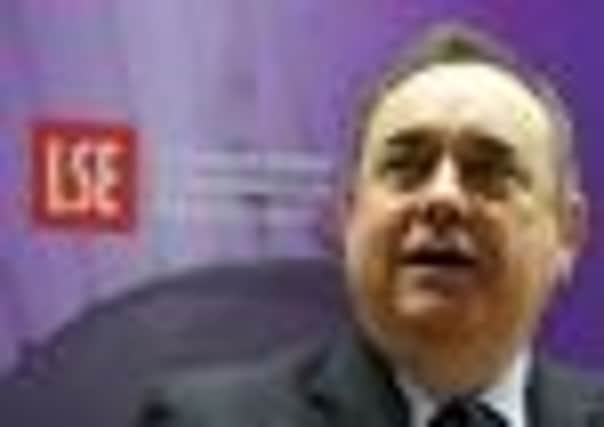Alex Salmond says Scotland can set aside £1bn oil cash a year


In a speech at London’s School of Economics last night, the First Minister argued that such an investment pot would hand Scotland a £30bn booty by 2035 to buffer itself against future economic storms.
The model copies the massive Sovereign Fund in Norway, built up on the back of the country’s vast oil reserves. SNP ministers claim that, as independence will in their view boost the economy, they will have more tax revenues to play with, and will be able to lay aside oil revenues.
Advertisement
Hide AdAdvertisement
Hide AdHowever, economic experts have argued that an independent Scotland would, like the UK, have a deficit and therefore would not be able to place oil money into savings.
Instead, they argue that the country would either need oil tax revenues to pay for schools, hospitals and public services, or to help pay down the share of the UK national debt which would accrue to Scotland after secession.
In the speech last night – Mr Salmond’s third in England since the New Year – he returned to the SNP’s favoured theme of North Sea oil, claiming that, had the country become independence in 1979, Scotland would have wiped out its debts by 1983, and run surpluses from the late 1980s onwards. Scotland would have had financial assets “worth anything from £87bn to £117bn”.
Labour last night said Mr Salmond should explain what public services he would not have paid for, in order to build up the fund.
Mr Salmond said: “The debate about independence is about looking forward and creating a better future for Scotland. With that future in mind, we still have an opportunity to establish an energy fund to benefit future generations.
“Even just £1bn a year – less than 10 per cent – invested over 20 years, would create a fund for Scotland worth almost 30bn.”
On top of that, the First Minister said, wind, wave and tidal power would “be the source of Scotland’s re-industrialisation”.
Despite losing cash from North Sea oil, Mr Salmond also argued that the rest of the UK “has much to gain from the emergence of a secure, prosperous ally to its north”.
Advertisement
Hide AdAdvertisement
Hide AdHe said: “An independent Scotland would seek to make a responsible contribution on the European and world stage – and that would benefit all of the nations of these islands.”
However, Mr Salmond’s claims on an oil fund have been disputed by economic analysts. Professor John McLaren, from Glasgow University’s Centre for Public Policy and the Regions, said last night: “The country has a £20bn deficit without oil. Why would you set up an oil fund when you are massively in debt?”
A previous report by the CPPR concluded that while Scotland would have a “slightly lower” deficit than the UK, thanks to projected oil receipts, the case for creating an oil fund was “largely redundant” because of the need to use the funds to top up current spending.
Other leading economists, such as Professor Brian Ashcroft, of Strathclyde University’s Fraser of Allander Institute, have warned that the huge swings in oil revenues from one year to the next would “make it difficult” for a post-independence Scottish Government to plan its spending properly.
In a question and answer session afterwards, Mr Salmond also suggested that a Scottish banking regulatory system would deal with “future problems together” with the UK and Europe.
Mr Salmond was also asked about Donald Trump’s attack on his plans to construct new wind turbines in Scotland. He said: “I don’t see why I have to agree with him on everything, and although we’re always interested to hear the views of lots and lots of people, I think it’s best to leave it to the parliament elected for that purpose.”
It also emerged yesterday that Mr Salmond had met Bank of England Governor Mervyn King, for talks in London.
Mr Salmond has declared that, in an independent Scotland, the Bank would become Scotland’s lender of last resort.
Advertisement
Hide AdAdvertisement
Hide AdAsked yesterday about the proposals, Sir Mervyn declined to respond, but did say he would comment on the Bank’s position before the referendum.
On Mr Salmond’s claims about an oil fund, Labour finance spokesman Ken Macintosh said last night: “If Scotland started an oil fund in the same year as Norway, the current balance would be zero, because we spend more on public services than we raise in tax. If Alex Salmond wants to change that, he needs to spell out what further cuts he is proposing because you can’t spend the same money twice.”
Scottish Liberal Democrat leader Willie Rennie MSP said: “After the latest poor Scottish unemployment figures following his failed Plan MacB, I would have thought Alex Salmond would have been more contrite about his solutions for Scotland.”
On the meeting with Sir Mervyn, a spokesman for the First Minister said: “It focused on the economic outlook, measures to boost growth and jobs, and the need for banks to meet their Project Merlin targets on lending to businesses.”